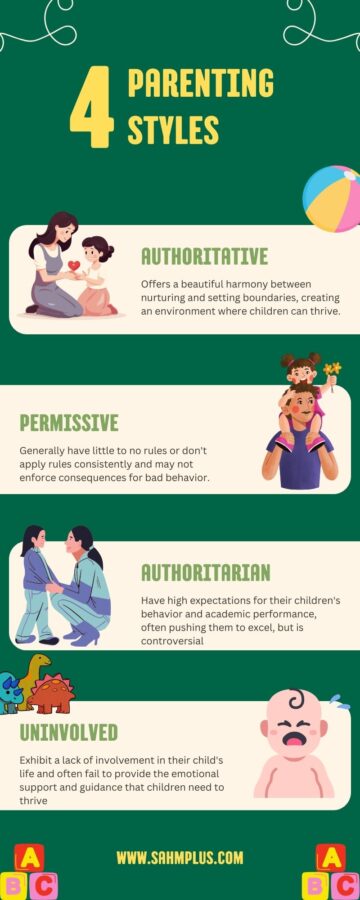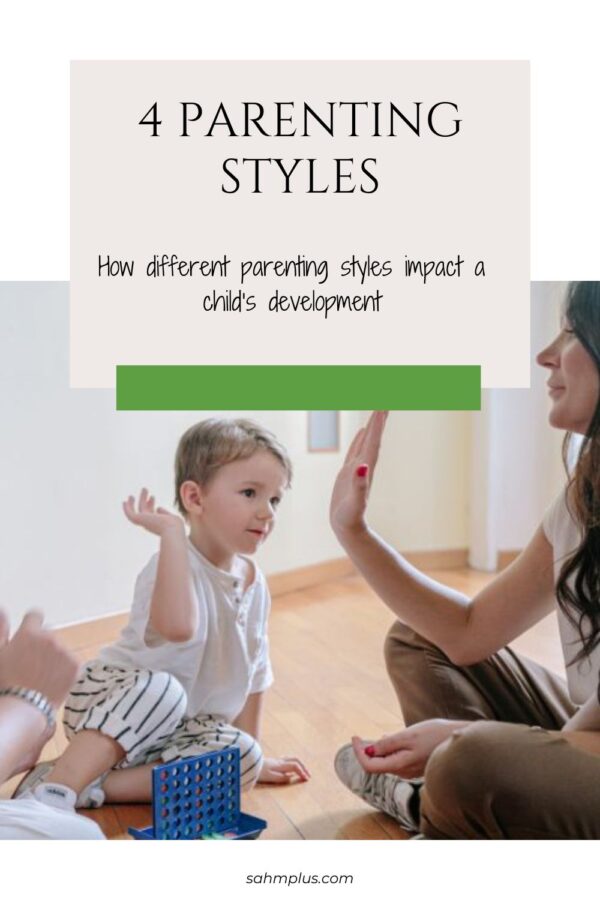As a parent navigating the bewildering task of raising kids, the concept of parenting styles probably sounds familiar. But do we truly know and understand our parenting styles and how they affect our children?
We all want the best for our little ones, but figuring out the right approach can sometimes feel like navigating a maze. So, let’s chat about parenting styles – what they are, where they come from, and how they can shape how we raise our children.
We’ll discuss 4 parenting styles and the pros and cons of each. But who even came up with these parenting styles, and what’s the deal with them?

Who Came Up With Parenting Styles?
The concept of parenting styles has evolved over time, shaped by the wisdom and insights of various experts in the field. While it is difficult to attribute the invention of parenting styles to a single individual, several pioneers have significantly contributed to its development.
One influential figure in the history of parenting styles is Diana Baumrind, a developmental psychologist who conducted extensive research on child psychology in the 1960s. Her groundbreaking work led her to propose three primary parenting styles: authoritative, authoritarian, and permissive. Baumrind’s research laid the foundation for understanding how different parental approaches can impact a child’s development.
Another notable contributor is Lev Vygotsky, a Soviet psychologist who emphasized the importance of social interaction and cultural context in shaping children’s behavior.
It is important to acknowledge that parenting styles are not fixed or universal. Instead, cultural, historical, and individual factors shape parenting styles. Over time, researchers and experts from various disciplines have added their perspectives and insights into this complex topic.
As we explore the history of parenting styles, we gain a deeper appreciation for the diverse range of approaches that parents have taken throughout different eras and cultures. By understanding their origins, we can continue to refine our own understanding of effective parenting practices while embracing new insights that emerge in our ever-evolving world.
What Are the 4 Parenting Styles?
Parenting is a journey filled with love, growth, and the opportunity to shape the lives of our children. As parents, we often wonder about the best approach to raising our little ones into confident and well-rounded individuals. That’s where understanding different parenting styles becomes essential.
Four main parenting styles have been widely recognized:
Each style has its unique characteristics and impact on child development.
Understanding these different approaches allows us to reflect on our own methods and make conscious choices about how we want to raise our children. Remember that there is no one-size-fits-all approach; what matters most is finding a balance that works for both you as a parent and your child’s unique needs.
By exploring these various parenting styles with an open mind, we can create an environment where our children thrive emotionally, socially, and intellectually. We can also commit to continuous growth for ourselves and our little ones.
The Authoritative Parenting Style: Striking a Balance Between Love and Discipline
Finding the right balance between love and discipline is essential as a parent. The authoritative parenting style offers a beautiful harmony between nurturing and setting boundaries, creating an environment where children can thrive.
Unlike authoritarian or permissive approaches, authoritative parents:
- Understand the importance of love and warmth in fostering a strong parent-child bond.
- Provide emotional support and actively listen to their children’s needs.
- Offer guidance with empathy, understanding, and patience.
- Recognize the significance of discipline in shaping a child’s character.
- Set clear expectations and establish consistent rules.
- Promote responsibility, accountability, and respect through these rules.
- Create a secure foundation for their children to explore their world while understanding limits.
This balanced approach allows children to develop self-discipline while feeling loved unconditionally. It cultivates independence, resilience, and critical thinking skills necessary for navigating life’s challenges.
Remember that being an authoritative parent is not about being perfect but rather striving for growth and improvement. It involves open communication, adapting strategies as your child grows, and embracing flexibility when needed.
By practicing authoritative parenting with compassion and understanding, we can raise confident individuals equipped to contribute positively to society.
The Permissive Parenting Style: Embracing Freedom and Flexibility
The permissive parenting style emphasizes freedom and flexibility. Rather than imposing strict rules and regulations, permissive parents embrace a more lenient approach. Permissive parents also tend to see themselves as their child’s friend.
Permissive parenting allows children to explore their own interests and make decisions for themselves. It encourages independence and fosters a sense of autonomy. By giving their children the freedom to express themselves and make choices, permissive parents create an environment that values individuality.
Flexibility is another key aspect of permissive parenting. Instead of rigidly enforcing rules, these parents adapt to different situations and circumstances. They understand that every child is unique and may require different levels of guidance.
While some may argue that this approach lacks structure or discipline, it is important to note that permissive parenting still provides boundaries and sets expectations. The focus, however, lies on open communication and understanding rather than authoritarian control.
By embracing freedom and flexibility in their parenting style, permissive parents empower their children to develop crucial life skills such as decision-making, problem-solving, and self-regulation. This approach encourages creativity, self-expression, and resilience in children as they navigate through life’s challenges.
Ultimately, the permissive parenting style reminds us that allowing our children space to grow while providing support can lead to confident individuals who are capable of making informed choices in their own lives.
Permissive parents generally have little to no rules or don’t apply rules consistently and may not enforce consequences for bad behavior.
The Authoritarian Parenting Style: Strict Rules and High Expectations
The authoritarian parenting style, characterized by strict rules and high expectations, has long been a topic of debate. While some may argue that it is too rigid and stifling, others believe that it instills discipline and fosters success.
In this approach, parents set clear boundaries and enforce them with consistency. They have high expectations for their children’s behavior and academic performance, often pushing them to excel. The obedience-focused approach emphasizes following rules without question.
While this parenting style can create a structured environment, it is essential to strike a balance. It is crucial for parents to also provide emotional support, understanding, and open communication with their children.
Remember that every child is unique and responds differently to various parenting styles. It’s important to consider the individual needs of your child while maintaining a nurturing environment that encourages growth and independence.
The Uninvolved Parenting Style: The Consequences of Neglectful Parenting
Adopting an uninvolved parenting style can result in significant consequences for your children.
Neglectful, or uninvolved, parents are those who exhibit a lack of involvement in their child’s life and often fail to provide the emotional support and guidance that children need to thrive. This can lead to feelings of abandonment and low self-esteem in the child, impacting their overall well-being.
The consequences of neglectful parenting extend beyond childhood. Children raised by uninvolved parents may struggle with forming healthy relationships and experience difficulties with trust and intimacy. They may also face challenges in managing emotions and making independent decisions.
It is essential to recognize the impact of neglectful parenting and work towards creating an environment where children feel valued, supported, and loved. By actively engaging with your children and showing them that they matter, you can help nurture their growth into confident individuals capable of navigating life’s challenges with resilience.
Why Parenting Styles Are Important
Parenting styles play a crucial role in shaping the future of your children. They are not just about how we discipline or nurture kids but also about the long-lasting impact they have on their development and overall well-being.
Understanding the importance of parenting styles is the key to creating a nurturing and supportive environment for our children. Different parenting styles can have varying effects on child development, influencing their behavior, emotional intelligence, and social skills.
Research has shown that authoritative parenting tends to promote positive outcomes in children. On the other hand, authoritarian or permissive parenting styles may lead to negative consequences such as low self-esteem or behavioral issues.
By recognizing the significance of parenting styles and their impact on our children’s lives, we can strive to become more intentional in our approach. Creating a balanced environment that fosters love, guidance, and respect can help shape confident and resilient individuals who thrive in all aspects of life. Remember that as parents or caregivers, we influence the future of our children through our nurturing presence and consistent support.
Finding Your Path: Blending Different Parenting Styles to Suit Your Family’s Needs
Each family is unique, and finding a parenting style that suits your family’s needs is vital to you and your child’s success. Blending different parenting styles allows you to create a personalized approach that considers your child’s individuality and family dynamics.
Adapting to your child’s needs is at the core of effective parenting. By combining elements from various parenting styles, you can tailor your approach to meet the specific requirements of your child. This flexibility allows you to provide them with the guidance, support, and discipline they need while nurturing their unique qualities.
Agreeing on parenting styles can be challenging, as each parent brings personal beliefs and experiences to the table. However, open communication and mutual respect can help you to find common ground. Embrace compromise and focus on what works best for your child rather than getting caught up in differences.
Remember that there is no right or wrong way to parent – it’s about finding what works for you and your family. Trust yourself as a parent and have confidence in your ability to create a loving and supportive environment for your children.
Embracing the Diversity of Parenting Styles for Healthy Child Development
Each parent brings a unique approach and perspective to raising their children, and it is vital to recognize and respect these differences.
By embracing diverse parenting styles, we create an environment that allows children to thrive. It teaches them acceptance, empathy, and open-mindedness from an early age. Children exposed to different parenting styles also develop a broader understanding of the world around them and learn to appreciate different perspectives.
Remember: there is no one-size-fits-all approach to parenting. What works for one family may not work for another. Instead of judging or criticizing different parenting styles, let us celebrate the fact that there are various ways to raise happy and healthy children.
With open communication, we create a supportive community where parents can learn from each other’s experiences and grow together.

FAQs About Parenting Styles
What is the most common parenting style?
The most common parenting style can vary depending on cultural and societal factors, but one of the widely recognized parenting styles is Authoritative Parenting. This style combines warmth and responsiveness with clear boundaries and expectations. Authoritative parents are nurturing and supportive while also setting reasonable rules and consequences.
Is there a perfect parenting style?
There’s no one-size-fits-all perfect parenting style. Parenting is a highly individualized journey, and what works best for one family might not work for another. What’s important is to find a parenting style that aligns with your values, your child’s personality, and your family’s unique dynamics. Flexibility and adaptability are key in parenting.
What are the 3 F’s of positive parenting?
The 3 F’s of positive parenting are Firmness, Fairness, and Friendliness:
- Firmness: Setting clear boundaries and expectations for your child’s behavior. It involves being consistent with rules and consequences.
- Fairness: Treating your child with fairness and equity. Avoid favoritism and strive to be just and objective in your parenting decisions.
- Friendliness: Building a warm and supportive relationship with your child. Show love, affection, and understanding to create a strong emotional connection.
What parenting style most typically has the best outcome?
Research suggests that Authoritative Parenting tends to have the best overall outcomes for children. This style promotes a healthy balance of independence, responsibility, and self-esteem. Children raised by authoritative parents often grow up to be self-confident, competent, and socially adept individuals.
Which parenting style is considered the most damaging to child outcomes?
The uninvolved parenting style is the most destructive. Children aren’t given the means to develop appropriately with neglectful parents who show no to little love and have very low expectations of their children. Neglectful parents aren’t building relationships or setting boundaries, which is a recipe for disaster.
Articles In Our Parenting Styles Series
- 4 Parenting Styles & What They Mean for Your Family
- Why Are Parenting Styles Important?
- How to Agree on Parenting Styles When Your Differences Hurt Your Marriage
- The More Children You Have, The More Your Parenting Style Changes
- Top Tips to Help You Change Your Parenting Style


1 comment
Children all want to have a loving and supportive family.
Comments are closed.